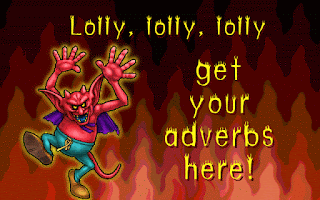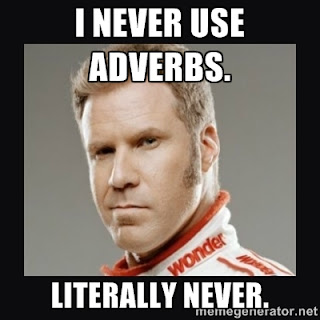With such widespread anti-adverb sentiment, one might wonder why we have adverbs at all if we are not supposed to use them. Are adverbs really so evil that using one will, like a bad apple, spoil an entire sentence?
You can deduce that my answer to this question is no simply by counting the adverbs I've used so far (8: once, well, famously, why,not, really, simply, and so far). Even in good writing, adverbs are not verboten (adverboten?).
What is an adverb?
To understand how to wield adverbs well, one should understand what an adverb is and isn't — and it be sure, it isn't always clear cut.If you remember your Schoolhouse Rock, you might recall that adverbs deal with manner, place, time, condition, reason, comparisons, and contrasts.
More likely, though you remember that earworm of a chorus: "Lolly, lolly, lolly get your adverbs here..." Those three lollies serve as a reminder that most adverbs end with -ly. But remember:
- Not all words that end with -ly are adverbs. That ugly but friendly family from Italy knows otherwise. (And don't forget Graham Greene's beastly.)
- Not all adverbs end in -ly. Never, otherwise, seldom (never *seldomly), and thus (not *thusly) are all sometimes adverbs.
- Some adverbs are not always adverbs. They can also be adjectives: "He claimed that he would take knitting competitions further (adv.) than anyone had ever taken them. Then he declined to make further (adj.) comments."
- Adverbs can also live in a gray area between adverb and conjunction. Adverbial conjunctives (or conjunctive adverbs) show temporal or causal relationships between clauses of a complex sentence or between sentences. For example, "I'll let go of my nose once the odor dissipates."

- A verb: He seldom ventured beyond the backyard.
- An adjective: It was an unconscionably violent movie.
- Another adverb: "Adverbs are really very simple," he lied.
- A preposition or prepositional phrase: The egg struck him in the forehead directly above his left eyebrow.
- A whole phrase, clause, or sentence: Unbelievably, he was still able to enunciate the entire alphabet with 57 marshmallows shoved in his mouth.
The Problem with Adverbs
Adverbs themselves are not the problem. Like guns, drugs, and yoga pants, theproblem with adverbs is overuse and abuse. People like to quote Stephen King's "road to hell" statement, but with a little more context, it becomes clear what he's really complaining about:
I believe the road to hell is paved with adverbs, and I will shout it from the rooftops. To put it another way, they're like dandelions. If you have one on your lawn, it looks pretty and unique. If you fail to root it out, however, you find five the next day . . . fifty the day after that . . . and then, my brothers and sisters, your lawn is totally, completely, and profligately covered with dandelions.(From Stephen King's On Writing, p. 125. Ellipsis points and boldface are from the original.)
King's gripe, then, isn't with the existence of adverbs but with their uncontrolled propagation. Like frogs and locusts, a few of them can make the view more interesting, but too many of them, and you've got a plague on your hands.
Like guns, drugs, and yoga pants, the problem with adverbs is overuse and abuse.

An over-reliance on adverbs can also stem from a writer's lack of either vocabulary or imagination. Adverbs are often used to add substance to otherwise substanceless verbs, such that a writer uses two or three mundane words where she could use a single, more descriptive, active, and interesting verb.
And sometimes adverbs are just pointless, adding nothing to a statement but length.
These guidelines may help:
When Using an Adverb Might Be Bad
1. When it restates a meaning that is already inherent in the word it modifies. For example, in the phrases "she gently caressed my arm" and "she violently hacked off my arm," the adverbs add nothing because the concepts of gentleness and violence are inherent in the verbs caress and hack, respectively.2. When it is meant to add description to a nondescript word. The solution to bland verbs and adjectives isn't to pile on adverbs; it's to replace the verbs and adjectives with something better. Consider these examples:
- "Julie called loudly for help because the hole where her brother's arm used to connect to his torso was bleeding profusely."
- "Julie rabidly screamed for help because blood was gushing from the hole where her brother's arm used to connect to his torso."
 Also notice that I slipped a new adverb into the second example. Rabidly screamed is, I think, a good use of an adverb because rabidly gives the reader information that screamed doesn't give — namely, Julie's emotional state during her outburst.
Also notice that I slipped a new adverb into the second example. Rabidly screamed is, I think, a good use of an adverb because rabidly gives the reader information that screamed doesn't give — namely, Julie's emotional state during her outburst.3. When it's literally. I really, really, really want literally to mean "literally" and not "figuratively." And I'm not alone. Check it whenever you see it.
4. When it's very. Very has no intrinsic meaning — it amplifies the word it's attached to. The English language is so varied, though, that there is probably a more interesting alternative to just tacking very onto what you've already got. There are probably four or five alternatives, in fact, and which you choose depends on your writing voice, your register, and your audience.
For example:
- very loud = ear-splitting, cacophonous, stentorian, raucous
- very large = humongous, titanic, gigantic, gargantuan
- very angry = livid, irate, infuriated, enraged
Substitute 'damn' every time you're inclined to write 'very;' your editor will delete it and the writing will be just as it should be.Considering how acceptable profanity has become — and that you're probably editing your own stuff — a stronger or more attention-grabbing word than damn might be called for.
I suggest pooptastically.
5. A word about only. Only can be either an adjective ("the only lactose-intolerant contestant") or an adverb ("he farted only once"), and where you place it can make all the difference. Consider how these statements differ:
- "Miss Crumpet is the only principal." (An adjective. She is the sole person in that position.)
- "Miss Crumpet is only the principal." (An adverb. If things get bad, we can still go to the superintendent.)
That doesn't mean that only used adverbial should always be right next to the verb that it technically modifies, but next to the word or words that it most closely relates to. Consider, for example, my placement of respectively a few paragraphs up.
When Is It Okay to Use an Adverb?
Adverbs aren't really evil, and there are times when an adverb is your best option.1. When it adds information or context that can't be achieved otherwise. "To boldly go where no man [later one] has gone before" doesn't have quite the ring to it without the adverbs boldly and before. ("To go where no man has gone"?) Still, I imagine Gene Roddenberry played around with words like explore, search, investigate, wander, and traverse before landing on the right euphonious phrase.
2. When the alternative is an overlong phrase or one that just falls flat. I have a personal beef with the phrase "in a _____ manner," and I reach for an adverb every time in order to avoid it. Similar cringe-worthy phrases are "on a _____ basis," "in a _____ way," and "in a _____ fashion."
Any long, meandering string of prepositional phrases might be improved by the deft insertion of an adverb.
3. When no other word will do. This is the true test for whether to use an adverb. Or any class of word, really. Writers and editors should pursue the exact right word every time. That's just part of what makes great writing great.
But with adverbs specifically, remember that three wrong words don't make one right one.
So, no, adverbs aren't evil. You can use them. Sometimes you must use them.
It might help to remember that, in spite of the aid it may give hell-bound road construction, even Stephen King uses adverbs from time to time, and he's still a pooptastically good writer.
Footnotes
1. Quoted in Allan Seager's The Glass House: The Life of Theodore Roethke, published by McGraw-Hill, 1968.
2. In Graham Greene's Ways of Escape, published by Simon & Schuster, 1980.
3. In Stephen King's On Writing, published by Scribner, 2000.
